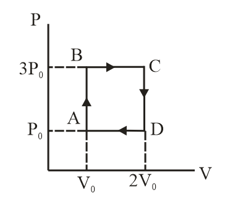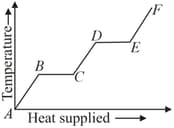Specific Heat Capacity of Gases
Specific Heat Capacity of Gases: Overview
This Topic covers sub-topics such as Specific Heat Capacity of Water, Mayer's Relation, Heat Capacity of Solids, Molar Specific Heat Capacity at Constant Pressure, Molar Specific Heat Capacity at Constant Volume and, Definition of a Calorie
Important Questions on Specific Heat Capacity of Gases
At a given temperature, the specific heat of a gas at constant pressure is always greater than its specific heat at constant volume.
An insulated box containing a diatomic gas of molar mass is moving with velocity . The box is suddenly stopped. The resulting change in temperature is . What will be the value of ?
The specific heat capacity of water is less than that of steam.
The specific heat capacity of water is less than that of ice.
The specific heat capacity of water is less than that of aluminium.
Define heat capacity and write its unit.
A molecule of a gas has six degrees of freedom. Then, the molar specific heat of the gas at constant volume is
One gram mole of an ideal gas with the ratio of constant pressure and constant volume specific heats is mixed with gram moles of another ideal gas with . If the for the mixture is , then what will be the value of ?
How much heat energy (in ) is necessary to raise the temperature of of water from to ?
An ideal monatomic gas is carried along the cycle as shown in the figure. The total heat absorbed in this process is

How the change in specific heat of the water can be explained at low temperatures?
Which statement is false for specific heat of water?
A source of heat supplies heat at a constant rate to a solid cube. The slope of portion of the graphs gives :-

For the next three questions
An ideal diatomic gas is expanded so that the amount of heat transferred to the gas is equal to the decrease in its internal energy.
The molar specific heat of the gas in this process is given by C whose value is
Two mole of oxygen is mixed with eight mole of helium. The effective specific heat of the mixture at constant volume is _____.
Two moles of a certain gas at a temperature, are cooled isochorically so that the pressure of the gas gets reduced by times. Then, as a result of isobaric process, the gas is allowed to expand till its temperature gets back to the initial value. Find the total amount of heat absorbed by gas in this process.
Find the specific heat of a mixture of two moles of and eight moles of at constant volume:
An ice cube of mass at is placed in an isolated container which is at . The specific heat of the container varies with temperature according to the empirical relation , where and . If the final temperature of the container is , determine the mass of the container.
(Latent heat of fusion for water specific heat of water )
One mole of an ideal monatomic gas at temperature expands slowly according to the law . If the final temperature is , heat supplied to the gas is: ( is a constant)
A thermally insulated piece of metal is heated under atmosphere by an electric current so that it receives electric energy at a constant power P. This leads to an increase of the absolute temperature T of the metal with time t as follows
Then the heat capacity is
